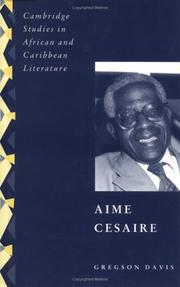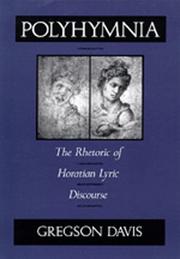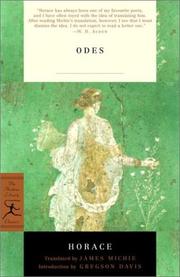| Listing 1 - 10 of 25 | << page >> |
Sort by
|

ISBN: 0521390729 0521055423 113908528X 0511549245 9780521055420 9780511549243 9780521390729 Year: 2008 Volume: *1 Publisher: Cambridge Cambridge University Press
Abstract | Keywords | Export | Availability | Bookmark
 Loading...
Loading...Choose an application
- Reference Manager
- EndNote
- RefWorks (Direct export to RefWorks)
Aimé Césaire is arguably the best-known poet in the French Caribbean. His poetry and drama have established his formidable reputation as the leading francophone poet and elder statesman of the twentieth century. In this study Gregson Davis examines the evolution of Césaire's poetic career and his involvement with many of the most seminal political and aesthetic movements of the twentieth century. Davis relates Césaire's extraordinary dual career as writer and elected politician to the recurrent themes in his writings. As one of the most profound critics of colonialism, Césaire, the acknowledged inventor of the famous term 'negritude', has been a hugely influential figure in shaping the contemporary discourse on the postcolonial predicament. Gregson Davis's account of Césaire's intellectual growth is grounded in a careful reading of the poetry, prose and drama that illustrates the full range and depth of his literary achievement.
Book
ISBN: 9789004233089 9004233083 9789004233256 9004233253 1283597160 9786613909619 9781283597166 6613909610 Year: 2012 Volume: 346 Publisher: Leiden Brill
Abstract | Keywords | Export | Availability | Bookmark
 Loading...
Loading...Choose an application
- Reference Manager
- EndNote
- RefWorks (Direct export to RefWorks)
This study of the Eclogues focuses on Vergil’s exploration of issues relating to the subject of human happiness ( eudaimonia )–ideas that were the subject of robust debate in contemporary philosophical schools, including the community of émigré Epicurean teachers and their Roman pupils located in the vicinity of Naples (“Parthenope”). The latent “interplay of ideas” implicit in the songs of the various poet-herdsmen centers on differing attitudes to acute misfortune and loss, particularly in the spheres of land dispossession and frustrated erotic desire. In the bucolic dystopia that Vergil constructs for his audience, the singers resort to different means of coping with the vagaries of fortune ( tyche ). This relatively neglected ethical dimension of the poems in the Bucolic collection receives a systematic treatment that provides a useful complement to the primarily aesthetic and socio-political approaches that have predominated in previous scholarship. 'This book is insightful and engaging; amatores of Vergil's Eclogues (scholars, students, or enthusiasts) will find the work accessible and profitable.' Kristi Eastin, California State University, Fresno
Virgil. --- Virgil. Bucolica. --- Languages & Literatures --- Greek & Latin Languages & Literatures --- Pastoral poetry, Latin --- History and criticism. --- Virgil. - Bucolica

ISBN: 0520070771 0520910303 0585139717 9780520910300 9780585139715 9780520070776 Year: 1991 Publisher: Berkeley University of California press
Abstract | Keywords | Export | Availability | Bookmark
 Loading...
Loading...Choose an application
- Reference Manager
- EndNote
- RefWorks (Direct export to RefWorks)
Horace's Odes have a surface translucency that belies their rhetorical sophistication. Gregson Davis brings together recent trends in the study of Augustan poetry and critical theory and deftly applies them to individual poems. Exploring four rhetorical strategies--what he calls modes of assimilation, authentication, consolation, and praise and dispraise--Davis produces enlightening, new interpretations of this classic work. Polyhymnia, named after one of the Muses invoked in Horace's opening poem, revises the common image of Horace as a complacent, uncomplicated, and basically superficial singer. Focusing on the artistic persona--the lyric "self" that is constituted in the text--Davis explores how the lyric speaker constructs subtle "arguments" whose building-blocks are topoi, recurrent motifs, and generic conventions. By examining the substructure of lyric argument in groupings of poems sharing similar strategies, the author discloses the major principles that inform Horatian lyric composition.
871 HORATIUS FLACCUS, QUINTUS --- Laudatory poetry, Latin --- -Odes --- -Rhetoric, Ancient --- Classical languages --- Greek language --- Greek rhetoric --- Latin language --- Latin rhetoric --- Lyric poetry --- Poetry --- Latin laudatory poetry --- Latin poetry --- 871 HORATIUS FLACCUS, QUINTUS Latijnse literatuur--HORATIUS FLACCUS, QUINTUS --- Latijnse literatuur--HORATIUS FLACCUS, QUINTUS --- History and criticism --- Rhetoric --- Horace --- Orazio --- Horacij Flakk, Kvint --- Rome --- In literature. --- Odes, Latin --- Rhetoric, Ancient. --- History and criticism. --- Odes --- Rhetoric, Ancient --- Greek & Latin Languages & Literatures --- Languages & Literatures --- Horace. --- Technique. --- Ancient rhetoric --- Horatius Flaccus, Q. --- Horatius Flaccus, Quintus --- Gorat︠s︡īĭ --- Gorat︠s︡iĭ Flakk, Kvint --- Horacij --- Horacio, --- Horacio Flaco, Q. --- Horacjusz --- Horacjusz Flakkus, Kwintus --- Horacy --- Horaṭiyos --- Horaṭiyus --- Horats --- Horaz --- Khorat︠s︡iĭ --- Khorat︠s︡iĭ Flak, Kvint --- Orazio Flacco, Quinto --- הוראציוס --- הורטיוס --- Laudatory poetry, Latin - History and criticism. --- Odes, Latin - History and criticism.
Book
ISBN: 9781405155403 9781444319194 140515540X 1282482459 140519734X 1444319183 1444319191 1782685944 9786612482458 Year: 2010 Publisher: Chichester, West Sussex, United Kingdom Malden, MA, USA : Blackwell,
Abstract | Keywords | Export | Availability | Bookmark
 Loading...
Loading...Choose an application
- Reference Manager
- EndNote
- RefWorks (Direct export to RefWorks)
Poets, Latin --- Epistolary poetry, Latin --- Laudatory poetry, Latin --- Verse satire, Latin --- History and criticism --- Horace --- Criticism and interpretation --- Rome --- In literature --- History and criticism. --- Horace. --- Criticism and interpretation. --- In literature. --- Poésie épistolaire latine --- Poésie élogieuse latine --- Poésie satirique latine --- Histoire et critique --- Rome dans la littérature --- Poètes latins --- Biography. --- Biographie --- Poètes latins --- Poésie épistolaire latine --- Poésie élogieuse latine --- Poésie satirique latine --- Rome dans la littérature --- Orazio --- Horacij Flakk, Kvint --- Horatius Flaccus, Quintus. --- Horatius Flaccus, Quintus --- Horatius Flaccus, Q. --- Gorat︠s︡īĭ --- Gorat︠s︡iĭ Flakk, Kvint --- Horacij --- Horacio, --- Horacio Flaco, Q. --- Horacjusz --- Horacjusz Flakkus, Kwintus --- Horacy --- Horaṭiyos --- Horaṭiyus --- Horats --- Horaz --- Khorat︠s︡iĭ --- Khorat︠s︡iĭ Flak, Kvint --- Orazio Flacco, Quinto --- הוראציוס --- הורטיוס --- Poets, Latin - Biography --- Epistolary poetry, Latin - History and criticism --- Laudatory poetry, Latin - History and criticism --- Verse satire, Latin - History and criticism --- Horace - Criticism and interpretation --- Rome - In literature
Book
Year: 1983 Publisher: Roma: Ateneo,
Abstract | Keywords | Export | Availability | Bookmark
 Loading...
Loading...Choose an application
- Reference Manager
- EndNote
- RefWorks (Direct export to RefWorks)
Book
Year: 1983 Publisher: Roma : Ateneo,
Abstract | Keywords | Export | Availability | Bookmark
 Loading...
Loading...Choose an application
- Reference Manager
- EndNote
- RefWorks (Direct export to RefWorks)
Book
Year: 1983 Publisher: Roma Ateneo
Abstract | Keywords | Export | Availability | Bookmark
 Loading...
Loading...Choose an application
- Reference Manager
- EndNote
- RefWorks (Direct export to RefWorks)
Book
ISBN: 1108954405 1108957676 1108845053 9781108949446 9781108845052 1108949444 9781108954402 1108957471 Year: 2022 Publisher: Cambridge Cambridge University Press
Abstract | Keywords | Export | Availability | Bookmark
 Loading...
Loading...Choose an application
- Reference Manager
- EndNote
- RefWorks (Direct export to RefWorks)
"The role of Greek thought in the final days of the Roman republic is a topic that has garnered much attention in recent years. This volume of essays, commissioned specially from a distinguished international group of scholars, explores the role and influence of Greek philosophy, specifically Epicureanism, in the late republic. It focuses primarily (although not exclusively) on the works and views of Cicero, premier politician and Roman philosopher of the day, and Lucretius, foremost among the representatives and supporters of Epicureanism at the time. Throughout the volume, the impact of such disparate reception on the part of these leading authors is explored in a way that illuminates the popularity as well as the controversy attached to the followers of Epicurus in Italy, ranging from ethical and political concerns to the understanding of scientific and celestial phenomena"--
Philosophy, Ancient. --- Epicurus --- Cicero, Marcus Tullius. --- Lucretius Carus, Titus. --- Influence. --- Ancient philosophy --- Greek philosophy --- Philosophy, Greek --- Philosophy, Roman --- Roman philosophy --- Lukrecjusz Karus, Tytus --- Lukret︠s︡iĭ Kar, Tit --- Lucrezio, Tito --- Lucrèce --- Lucrez --- Lukrez --- Lucrecio Caro, T. --- Caro, T. Lucrecio --- Carus, Titus Lucretius --- Lucretius --- Lucrezio Caro, Tito --- Lucrecio --- Lucreti Cari, T. --- Lucreci --- לוקרציוס קרוס, טיטוס --- Cicero, Marcus Tullius --- T︠S︡it︠s︡eron, Mark Tulliĭ --- Cyceron --- Cicéron --- Kikerōn --- Cicerón, M. Tulio --- Ḳiḳero --- Cicerone --- M. Tulli Ciceronis --- Cicéron, Marcus --- Cicerón, Marco Tulio --- Ḳiḳero, Marḳus Ṭulyus --- Tullius Cicero, Marcus --- Cicerone, M. T. --- Kikerōn, M. T. --- Cicerone, M. Tullio --- Cicero --- Cicero, M. T. --- Cyceron, Marek Tulliusz --- ציצרון, מארקוס טולליוס --- קיקרו, מארקוס טוליוס --- קיקרו, מרקוס טוליוס --- キケロ --- 西塞罗 --- Ἐπίκουρος --- Epikouros --- Epikuros --- Ėpikur --- Epiḳoros --- Epicuro --- Abīqūr --- Yibijiulu --- Epicure --- Epʻikʻurosŭ --- Lucrezio --- Epicurus - Influence --- Philosophy, Ancient
Book
ISBN: 1009281402 1009281429 1009281410 1009281399 Year: 2023 Publisher: Cambridge : Cambridge University Press,
Abstract | Keywords | Export | Availability | Bookmark
 Loading...
Loading...Choose an application
- Reference Manager
- EndNote
- RefWorks (Direct export to RefWorks)
The role of Greek thought in the final days of the Roman republic is a topic that has garnered much attention in recent years. This volume of essays, commissioned specially from a distinguished international group of scholars, explores the role and influence of Greek philosophy, specifically Epicureanism, in the late republic. It focuses primarily (although not exclusively) on the works and views of Cicero, premier politician and Roman philosopher of the day, and Lucretius, foremost among the representatives and supporters of Epicureanism at the time. Throughout the volume, the impact of such disparate reception on the part of these leading authors is explored in a way that illuminates the popularity as well as the controversy attached to the followers of Epicurus in Italy, ranging from ethical and political concerns to the understanding of scientific and celestial phenomena.
Influence (Literary, artistic, etc.) --- Philosophy, Ancient. --- Epicurus. --- Rome --- History --- Ancient philosophy --- Greek philosophy --- Philosophy, Greek --- Philosophy, Roman --- Roman philosophy --- Artistic impact --- Artistic influence --- Impact (Literary, artistic, etc.) --- Literary impact --- Literary influence --- Literary tradition --- Tradition (Literature) --- Art --- Influence (Psychology) --- Literature --- Intermediality --- Intertextuality --- Originality in literature --- Epicurus --- Ἐπίκουρος --- Epikouros --- Epikuros --- Ėpikur --- Epiḳoros --- Epicuro --- Abīqūr --- Yibijiulu --- Epicure --- Epʻikʻurosŭ --- Cicero, Marcus Tullius. --- Influence. --- Cicero, Marcus Tullius --- Cicero --- T︠S︡it︠s︡eron, Mark Tulliĭ --- Cyceron --- Cicéron --- Kikerōn --- Cicerón, M. Tulio --- Ḳiḳero --- Cicerone --- M. Tulli Ciceronis --- Cicéron, Marcus --- Cicerón, Marco Tulio --- Ḳiḳero, Marḳus Ṭulyus --- Tullius Cicero, Marcus --- Cicerone, M. T. --- Kikerōn, M. T. --- Cicerone, M. Tullio --- Cicero, M. T. --- Cyceron, Marek Tulliusz --- ציצרון, מארקוס טולליוס --- קיקרו, מארקוס טוליוס --- קיקרו, מרקוס טוליוס --- キケロ --- 西塞罗

ISBN: 030743155X 0375759026 1299145132 Publisher: Modern Library
Abstract | Keywords | Export | Availability | Bookmark
 Loading...
Loading...Choose an application
- Reference Manager
- EndNote
- RefWorks (Direct export to RefWorks)
| Listing 1 - 10 of 25 | << page >> |
Sort by
|

 Search
Search Feedback
Feedback About UniCat
About UniCat  Help
Help News
News